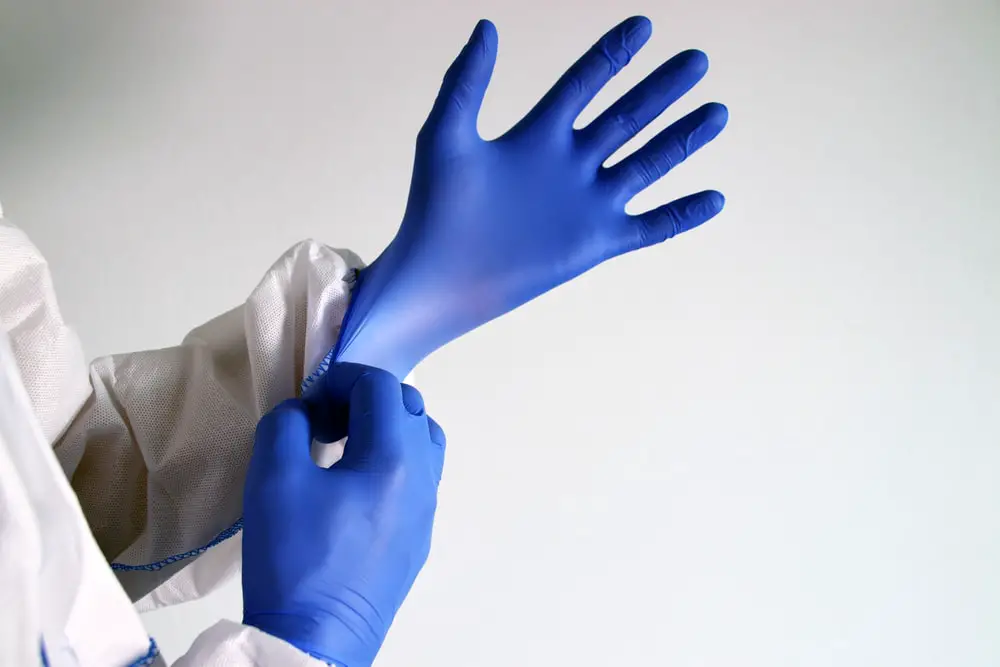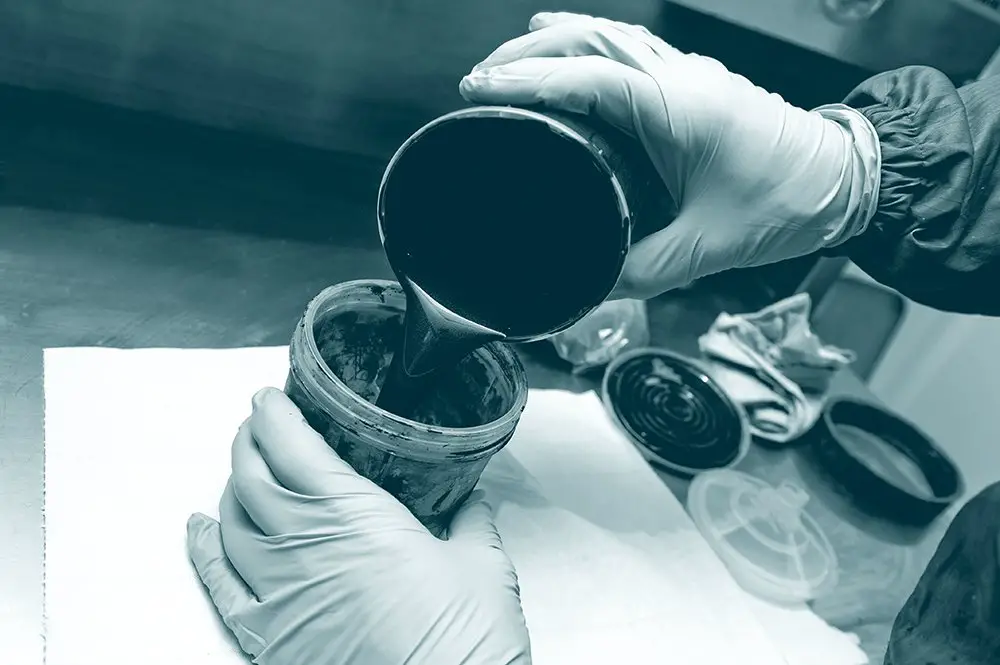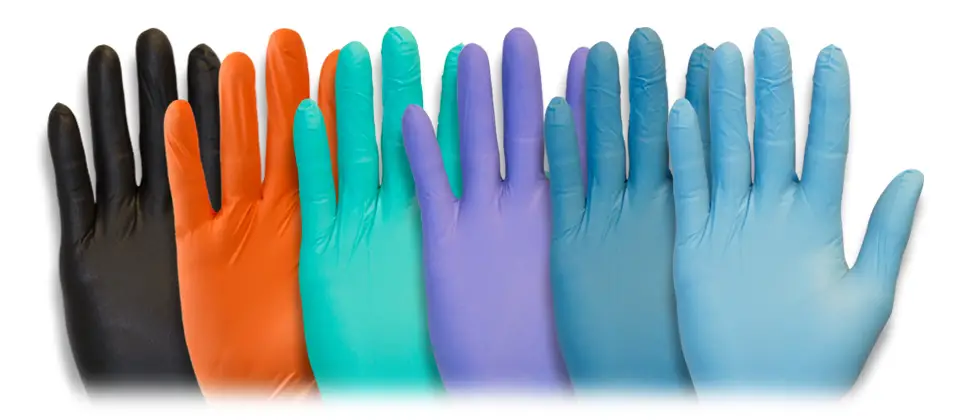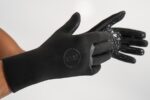It’s a very prevalent knowledge that nitrile gloves are most preferred for the medical sector and the food industry. What’s a lesser-known fact (but very important) is that all nitrile gloves are not the same.
Nitrile gloves are of two grades: medical grade nitrile gloves and industrial grade nitrile gloves. Interestingly, even medical grade nitrile gloves and industrial gloves aren’t all the same: they can be black, blue, orange, and purple. And every color signifies a different purpose.
Medical grade nitrile gloves are approved by the FDA and industrial grade nitrile gloves are accepted by the FDA. The difference between accepted and approved is quite substantial when it’s the healthcare sector and the food sector in question.

There are many such questions that still revolve around the uses, benefits, and types of nitrile gloves.
This article is an attempt at helping you understand nitrile gloves better. Dive in for all the answers!
What is different about nitrile gloves?
Prior to the advent of nitrile gloves, it was vinyl gloves and rubber gloves that were most popular. Soon it was discovered the latex in rubber gloves and dioxins in vinyl gloves were a serious threat to human health and the environment alike.
Considering these threats, many countries even banned the use of vinyl gloves. Nitrile gloves that were synthesized in labs started becoming more popular (at least, amongst experts).
The major difference that sets nitrile gloves apart is that they offer only the good properties of vinyl and rubber, minus the negatives.
Nitrile gloves don’t have latex; hence, they’re perfect for people with latex allergies. They are dioxin-free. Again, they overcome the shortcomings of vinyl gloves.
Top 7 benefits of wearing nitrile gloves
Other than the obvious that they’re non-toxic and latex-free, nitrile gloves have many other benefits that you must know.
#1 They are highly resistant to chemicals
Nitrile gloves have a single or a double coating of chlorine. It gives them extra resistance against heavy chemicals. They can also be used in the paint industry since they will easily protect hands from chemicals present in the paint.

Please note: Nitrile gloves cannot withstand concentrated acids or corrosive acids. So, be very careful when handling such acids since nitrile has its limits.
#2 They offer protection from contaminants
Have you ever wondered why lab workers and technicians wear nitrile gloves? That’s because there’s no material better than nitrile rubber that offers protection from blood-borne pathogens.
They’re also very good choices for sanitation workers and frontline workers who are exposed to high viral load.
#3 They’re flexible and strong
It’s easier to find nitrile gloves in your size because these gloves are highly stretchable. They adhere to the shape of your hands. Since they’re strong, the tips of your fingers won’t tear the gloves apart.
Nitrile gloves offer a comfortable snug fitting that keeps your hands safe and secured.
#4 They’re resistant to abrasion
Nitrile gloves, despite being disposable, have a shelf life of 5 years. They’re extremely resistant to wear and tear.
#5 They’re puncture-resistant
Did you know that nitrile rubber has a puncture resistance that’s three times the protection that latex gloves can offer?
The surface of nitrile cannot be penetrated so easily. That’s why they offer better protection against cuts. Hence, you’ll commonly find tattoo artists and surgeons using these gloves while at work.
#6 They’re waterproof
The nitrile is waterproof. Hence, nitrile gloves are always used by surgeons since the chances of the gloves getting wet while performing surgery are very high.
Even in general, since they’re waterproof, the fabric won’t get bad even if the gloves are exposed to water.
Temperature facts about nitrile gloves: they can easily withstand a temperature between (-)40° C to 108°C.
#7 They’re non-slippery
Nitrile gloves offer a stunning grip even when your hands are wet. When handling tools while wearing these gloves, your grip won’t get loose. This is another reason that surgeons and dentists wear nitrile gloves.
What makes them so non-slippery is the fact that they’re resistant to grease and oils. Hence, mechanics also find these gloves to be very useful and safe.
What are nitrile gloves used for?
You already know the kinds of benefits nitrile gloves offer and also the temperature extremities they can withstand. Naturally, it should be clear that they can be used for many purposes.
We’ve listed some of the most noteworthy industries and jobs where these gloves offer immense protection.
-
-
- Automobile industry.
- Petroleum and oil industries.
- Tattoo artists.
- Surgeons, physicians, and dentists.
- Lab workers and sanitation workers.
- Mechanics.
- Chefs.
- Gardening and agriculture.
-
Color classification of nitrile gloves
There are basically 4 major color classifications in nitrile gloves. Let’s have a look at what these classifications mean in the pointers listed below.

1.) Blue nitrile gloves – Blue color in nitrile gloves is to classify that they’re latex-free.
2.) Black nitrile gloves – Industrial workers and tattoo artists prefer wearing black nitrile gloves.
3.) Purple nitrile gloves – Oncologists administering chemotherapy use purple nitrile gloves.
4.) Orange nitrile gloves – Since the orange color can be easily seen when there’s less light, these nitrile gloves are used in dark spaces. Even mechanics prefer using orange nitrile gloves.
3 cons of nitrile gloves you should know
1.) Nitrile gloves are expensive.
2.) They’re a little less tactile.
3.) They don’t offer protection from oxidizing acids.
What is the difference between medical grade nitrile gloves and industrial grade nitrile gloves?
Medical grade nitrile gloves are examination gloves used by surgeons and physicians. They have the approval of the FDA.
Industrial grade gloves are accepted by FDA because if not used in the medical care sector, they’re safe. They’ve failed some tests that the FDA conducts. But, even the fact that they’re accepted by the FDA means that they have very good quality.
Always remember, you can use medical grade nitrile gloves for handling food but you mustn’t use industrial grade nitrile gloves for medical purposes since the gloves should be FDA approved to be used in the healthcare sector.
FAQs
1.) How do I choose nitrile gloves?
Despite they’re stretchable and flexible, you’ve still got to choose the perfect size. The gloves should be snug.
Once you wear the gloves, flex your fingers and stretch them at their full length. They shouldn’t feel uncomfortable. If there’s a gap left between the gloves and the fingers even after you’ve stretched your fingers, the gloves are loose.
Also, look for textured fingers if you require more grip. Always choose gloves according to the kind of work you have to do.
2.) When should you not wear nitrile gloves?
Do not ever use nitrile gloves if you’re working with ketones, concentrated acids, corrosive acids, and aromatic solvents.
3.) Are there different grades of nitrile gloves?
Yes. There are two grades: medical grade and industrial grade.
Nitrile gloves can also be classified as sterile nitrile gloves and non-sterile nitrile gloves. The sterile ones are used by surgeons or where there’s direct contact with body fluids. The non-sterile one is used for physical examination.
4.) Do nitrile gloves have latex?
No, they don’t have latex that real rubber gloves have. That’s why these are non-allergenic gloves for people who have a latex allergy.
5.) Why do hospitals use blue nitrile gloves?
It’s done in order to establish that the gloves do not contain latex.
6.) Do nitrile gloves protect against acids?
Yes. Nitrile gloves have coatings of chlorine that make them repel acids. They’re resistant to not only mild acids but also heavy acids (as long as the acids aren’t corrosive and concentrated).
7.) Can nurses use nitrile gloves?
Yes. Nurses that assist surgeons must use nitrile gloves. In fact, everybody involved in patient care should use nitrile gloves. It’s safer for the patients as well as the staff.
8.) Are nitrile gloves single use?
Yes, nitrile gloves are disposable. However, they’re the strongest and the safest options out there in the market.
9.) How long do nitrile gloves last?
When they’re stored properly, their shelf life is as high as five years.
Concluding Thoughts
All nitrile gloves are not the same. They can be classified as medical grade and industrial grade. Even medical grade nitrile gloves can be further classified as sterile and non-sterile.
The kind of variety in color is also a factor you should consider. It’s not just for fashion that nitrile gloves are made in different colors. Every color has a meaning.
However, the color difference doesn’t signify quality. Every medical grade nitrile glove is equally safe since they’ve all passed the FDA tests.
We hope that now you’ll be able to buy the right sort of nitrile gloves according to your job.







